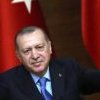Source
#Wall Street Journal (United States)
141 articles
by Henry Kissinger

New York (USA) | 4 April 2020
by Recep Tayyip Erdoğan

Ankara (Turkey) | 11 September 2018
by Jared Kushner

24 April 2018
by John McCain

New York (USA) | 5 October 2016
by Henry Kissinger

Washington D. C. (États-Unis) | 17 October 2015
by Tom Malinowski

18 May 2014
by Bashar al-Assad

Damascus (Syria) | 31 January 2011
by Gordon Brown , Nicolas Sarkozy

10 December 2009
by Gordon Brown , Nicolas Sarkozy
8 July 2009
by Amir Taheri
1 March 2006
by Irshad Manji
1 March 2006
by Bret Stephens
24 January 2006
by Abdurrahman Wahid
19 January 2006
by Paul Gigot
13 January 2006
by Joseph I. Lieberman
12 January 2006